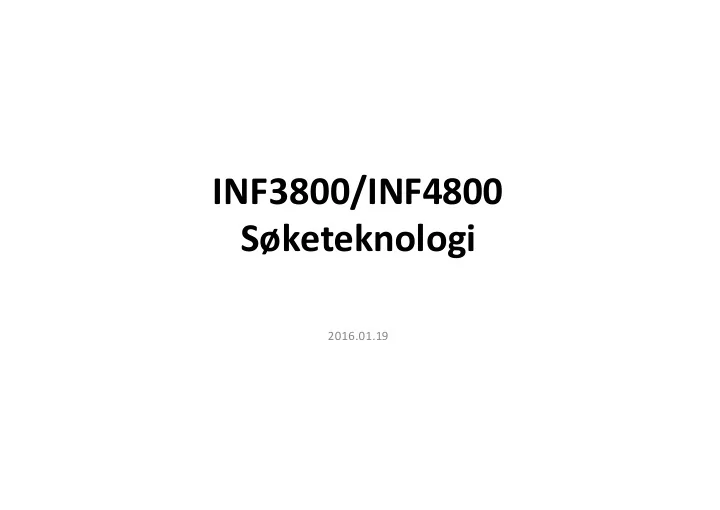

INF3800/INF4800 Søketeknologi 2016.01.19
Foreleser Aleksander ¡Øhrn, ¡Professor ¡II aleksaoh@ifi.uio.no
Gruppelærere Camilla ¡Emina Stenberg Jan ¡Kristian ¡Furulund camilest@student.matnat.uio.no jankfu@student.matnat.uio.no
http://nlp.stanford.edu/IR-‑book/information-‑retrieval-‑book.html Pensum +
Introduksjon
The ¡Sweetspot Distributed ¡ Systems Information ¡ Language ¡ Retrieval Technology
Web ¡Search
alltheweb.com 1999-‑2003
Enterprise ¡Search Much ¡more ¡than ¡intranets
Data ¡Centers alltheweb.com ¡2000
Data ¡Centers Microsoft ¡2010 http://www.youtube.com/watch?v=K3b5Ca6lzqE http://www.youtube.com/watch?v=PPnoKb9fTkA
Search ¡Platform ¡Anatomy The ¡50,000 ¡Foot ¡View Document Crawler Indexer Processing Result Data ¡Mining Index Processing Query Search Front ¡End Processing
Scaling Content ¡Volume • – How ¡many ¡documents ¡are ¡there? – How ¡large ¡are ¡the ¡documents? Content ¡Complexity • – How ¡many ¡fields ¡does ¡each ¡document ¡have? – How ¡complex ¡are ¡the ¡field ¡structures? Query ¡Traffic • – How ¡many ¡queries ¡per ¡second ¡are ¡there? – What ¡is ¡the ¡latency ¡per ¡query? Update ¡Frequency • – How ¡often ¡does ¡the ¡content ¡change? Indexing ¡Latency • – How ¡quickly ¡must ¡new ¡data ¡become ¡searchable? Query ¡Complexity • – How ¡many ¡query ¡terms ¡are ¡there? – What ¡is ¡the ¡type ¡and ¡structure ¡of ¡the ¡query ¡terms? ¡
Scaling Scale ¡through ¡replicating ¡the ¡partitions Query ¡Traffic Content ¡Volume Scale ¡through ¡partitioning ¡the ¡data
Crawling ¡The ¡Web
Processing ¡The ¡Content HTML, ¡PDF, ¡Word, ¡ UTF-‑8, ¡ISCII, ¡ ¡ English, ¡Polish, ¡ Title, ¡headings, ¡ Excel, ¡PowerPoint, ¡ KOI8-‑R, ¡Shift-‑JIS, ¡ Danish, ¡Japanese, ¡ body, ¡navigation, ¡ XML, ¡Zip, ¡… ISO-‑8859-‑1, ¡… Norwegian, ¡… ads, ¡footnotes, ¡… Format ¡detection Encoding ¡detection Language ¡detection Parsing “buljongterning”, ¡ “30,000”, ¡ Go, ¡went, ¡gone “Rindfleischetikett “L’Hôpital’s rule”, ¡ Øhrn, ¡Ohrn, ¡ Car, ¡cars ierungsüberwachu “ 台湾研究 “, ¡… Oehrn, ¡Öhrn, ¡… Silly, ¡sillier, ¡silliest ngsaufgabenübert ragungsgesetz”, ¡… Tokenization Character ¡normalization Lemmatization Decompounding Persons, ¡ Sports, ¡Health, ¡ Who ¡said ¡what, ¡ companies, ¡ Positive ¡or ¡ World, ¡Politics, ¡ who ¡works ¡where, ¡ events, ¡locations, ¡ negative, ¡liberal ¡ Entertainment, ¡ what ¡happened ¡ dates, ¡quotations, ¡ or ¡conservative, ¡… Spam, ¡Offensive ¡ when, ¡… … Content, ¡… Entity ¡extraction Relationship ¡extraction Sentiment ¡analysis Classification
Creating ¡The ¡Index Word Document Position tea 4 22 4 32 4 76 8 3 teacart 8 7 teach 2 102 2 233 8 77 teacher 2 57
Deploying ¡The ¡Index
Processing ¡The ¡Query “I ¡am ¡looking ¡for ¡ “LED ¡TVs ¡between ¡ fish ¡restaurants ¡ $1000 ¡and ¡$2000” near ¡Majorstua” “hphotos-‑snc3 ¡ fbcdn” “brintney speers pics” “23445 ¡+ ¡43213”
Searching ¡The ¡Content http://www.stanford.edu/class/cs276/handouts/lecture2-‑dictionary.pdf Assess ¡relevancy ¡as ¡we ¡go ¡along
Searching ¡The ¡Content Federation Query ¡processing Result ¡processing Dispatching Merging Searching Caption ¡generation “Divide ¡and ¡conquer”
Searching ¡The ¡Content Tiering • Organize ¡the ¡search ¡nodes ¡in ¡a ¡row ¡into ¡multiple ¡ tiers Tier ¡1 • Top ¡tier ¡nodes ¡may ¡have ¡fewer ¡documents ¡and ¡ run ¡on ¡better ¡hardware Fall ¡through? • Keep ¡the ¡good ¡stuff ¡in ¡the ¡top ¡tiers • Only ¡fall ¡through ¡to ¡the ¡lower ¡tiers ¡if ¡not ¡enough ¡ Tier ¡2 good ¡hits ¡are ¡not ¡found ¡in ¡the ¡top ¡tiers • Analyze ¡query ¡logs ¡to ¡decide ¡which ¡documents ¡ Fall ¡through? that ¡belong ¡in ¡which ¡tiers Tier ¡3 “All ¡search ¡nodes ¡are ¡equal, ¡but ¡some ¡are ¡more ¡equal ¡than ¡others”
Searching ¡The ¡Content Context ¡Drilling Body, ¡headings, ¡title, ¡ click-‑through ¡queries, ¡ anchor ¡texts Headings, ¡title, ¡click-‑ through ¡queries, ¡ anchor ¡texts Title, ¡click-‑through ¡ queries, ¡anchor ¡texts Click-‑through ¡queries, ¡ anchor ¡texts “If ¡the ¡result ¡set ¡is ¡too ¡large, ¡only ¡consider ¡the ¡superior ¡contexts”
Relevancy Anchor ¡texts, ¡click-‑ through ¡queries, ¡tags, ¡ … Page ¡rank, ¡link ¡ Title, ¡anchor ¡texts, ¡ cardinality, ¡item ¡profit ¡ headings, ¡body, ¡… margin, ¡popularity, ¡… Crowdsourced annotations Document ¡quality Match ¡context Term ¡frequency, ¡ inverse ¡document ¡ Freshness, ¡date ¡of ¡ frequency, ¡ publication, ¡buzz ¡ completeness ¡in ¡ factor, ¡… superior ¡contexts, ¡ proximity, ¡… Basic ¡statistics Timeliness Relevancy ¡score “Maximize ¡the ¡normalized ¡discounted ¡cumulative ¡gain ¡(NDCG)”
Processing ¡The ¡Results Faceted ¡browsing • What ¡are ¡the ¡distributions ¡of ¡data ¡across ¡ – the ¡various ¡document ¡fields? “Local” ¡versus ¡“global” ¡meta ¡data – Result ¡arbitration • Which ¡results ¡from ¡which ¡sources ¡should ¡ – be ¡displayed ¡in ¡a ¡federation ¡setting? How ¡should ¡the ¡SERP ¡layout ¡be ¡rendered? – Unsupervised ¡clustering • Can ¡we ¡automatically ¡organize ¡the ¡results ¡ – set ¡by ¡grouping ¡similar ¡items ¡together? Last-‑minute ¡security ¡trimming • Does ¡the ¡user ¡still ¡have ¡access ¡to ¡each ¡ – result?
Data ¡Mining
Applications
http://www.google.com/jobs/britney.html Spellchecking
Spellchecking britnay spears vidios Generate ¡candidates britney shears videos bridney speaks vidoes birtney vidies Find ¡the ¡best ¡path 1. Generate ¡a ¡set ¡of ¡candidates ¡per ¡query ¡term ¡using ¡approximate ¡matching ¡techniques. ¡Score ¡each ¡ candidate ¡according ¡to, ¡e.g., ¡“distance” ¡from ¡the ¡query ¡term ¡and ¡usage ¡frequency. 2. Find ¡the ¡best ¡path ¡in ¡the ¡lattice ¡using ¡the ¡Viterbi ¡algorithm. ¡Use, ¡e.g., ¡candidate ¡scores ¡and ¡ bigram ¡statistics ¡to ¡guide ¡the ¡search.
Entity ¡Extraction … … … … … Levels ¡of ¡abstraction MAN FOOD N/proper V/past/eat DET ADJ N/singular Richard ate some bad curry 1. Logically ¡annotate ¡the ¡text ¡with ¡zero ¡or ¡more ¡computed ¡layers ¡of ¡ meta ¡data. ¡The ¡original ¡surface ¡form ¡of ¡the ¡text ¡can ¡be ¡viewed ¡as ¡ trivial ¡meta ¡data. 2. Apply ¡a ¡pattern ¡matcher ¡or ¡grammar ¡over ¡selected ¡layers. ¡Use, ¡e.g., ¡ handcrafted ¡rules ¡or ¡machine-‑trained ¡models. ¡Extract ¡the ¡surface ¡ forms ¡that ¡correspond ¡to ¡the ¡matching ¡patterns.
Sentiment ¡Analysis “What ¡is ¡the ¡current ¡ perception ¡of ¡my ¡ brand?” “I ¡want ¡to ¡stay ¡at ¡a ¡hotel ¡ whose ¡user ¡reviews ¡ have ¡a ¡definite ¡positive ¡ tone.” http://research.microsoft.com/en-‑us/projects/blews/ “What ¡are ¡the ¡most ¡ 1. To ¡construct ¡a ¡sentiment ¡vocabulary, ¡start ¡by ¡defining ¡a ¡small ¡seed ¡ emotionally ¡charged ¡ set ¡of ¡known ¡polar ¡opposites. issues ¡in ¡American ¡ politics ¡right ¡now?” 2. Expand ¡the ¡vocabulary ¡by, ¡e.g., ¡looking ¡at ¡the ¡context ¡around ¡the ¡ seeds ¡in ¡a ¡training ¡corpus. 3. Use ¡the ¡expanded ¡vocabulary ¡to ¡build ¡a ¡classifier. ¡Apply ¡special ¡ heuristics ¡to ¡take ¡care ¡of, ¡e.g., ¡negations ¡and ¡irony.
Recommend
More recommend